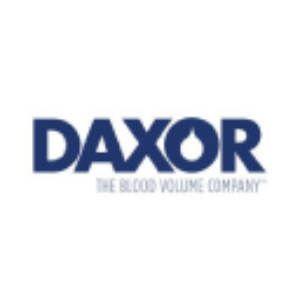Daxor’s Blood Volume (BVA-100®) Diagnostic Demonstrates Clinical Utility In Critically-Ill COVID-19 Patients In Newly Published Data in Journal Critical Care
Daxor Corporation (NYSE: DXR) recently announced the publication of new data in Critical Care, highlighting the effectiveness of its BVA-100 diagnostic blood test in assessing blood volume alterations in critically ill COVID-19 patients. The research reveals significant capillary damage and blood volume deficits in these patients, emphasizing the need for fluid management. Following this, a multi-center study is underway at prominent hospitals including Wake Forest and NYU Langone Health to further explore these findings, potentially enhancing clinical outcomes.
- BVA-100 test shows potential to improve fluid management in critically ill COVID-19 patients.
- The study emphasizes Daxor's technology, enhancing its credibility and market position.
- Ongoing multi-center study could lead to further validation of BVA-100's efficacy.
- The widespread acceptance of BVA-100 may face competition from similar diagnostic tools.
- Clinical trials incur costs and may face delays, impacting timelines for adoption.
Insights
Analyzing...
Data Led to Multi-Center Study In Progress At Three Leading Hospitals
Oak Ridge, TN, Aug. 04, 2021 (GLOBE NEWSWIRE) -- Daxor Corporation (NYSE MKT: DXR), the global leader in blood volume measurement technology, today announces new data published in the journal Critical Care showing Daxor’s unique BVA-100 diagnostic blood test provides insights into the pathophysiology of volume derangements and capillary distress in critically ill COVID-19 patients enabling improved care.
The Research Letter titled “Blood volume and albumin transudation in critically-ill COVID-19 patients” studied the abnormal blood volume profiles in mechanically ventilated patients admitted to the ICU at a leading medical center in New York. The data shows that COVID-19 patients suffer from significant capillary damage and blood volume deficits that care teams became aware of through the use of the Daxor BVA-100 blood test.
Dr. Jan Bakker, the author of the research letter, stated “Fluid resuscitation in COVID-19 patients could benefit from knowing the blood volume and capillary leak rate of patients as they are subject to significant leak and related hypovolemia.” Dr. Bakker noted that he has initiated a multi-center prospective study utilizing the BVA-100 blood test to understand fluid imbalances in COVID-19 patients as a result of this initial research. The study has passed the half-way mark of enrollment at Wake Forest School of Medicine, Oregon Health & Science University and NYU Langone Health (NCT04517695).
“Having this preliminary data published in such a prestigious medical journal as Critical Care highlights the importance of Daxor’s BVA technology in helping clinicians understand COVID-based volume derangements to improve care and outcomes,” said Michael Feldschuh, CEO and President of Daxor. “Daxor’s BVA test is the first and only diagnostic test cleared by FDA that offers insights into patients’ blood volume with a
About Daxor Corporation
Daxor Corporation (NYSE: DXR) is the global leader in blood volume measurement technology focused on blood volume testing innovation (organized as an investment company with fully-owned innovative medical instrumentation and biotechnology operations). We developed and market the BVA-100® (Blood Volume Analyzer), the first diagnostic blood test cleared by the FDA to provide safe, accurate, objective quantification of blood volume status and composition compared to patient-specific norms. The BVA technology enhances hospital performance metrics in a broad range of surgical and medical conditions, including heart failure and critical care, by informing treatment strategies, resulting in significantly improved multiple measures of patient outcomes. Daxor's mission is to advance healthcare by enabling optimal fluid management with blood volume analysis. Daxor’s vision is optimal blood volume for all. For more information, please visit our website at Daxor.com.
Forward-Looking Statements
Certain statements in this release may include forward-looking statements within the meaning of the Private Securities Litigation Reform Act of 1995, including without limitation, statements regarding the impact of hiring sales staff and expansion of our distribution channels. Forward-looking statements are predictions, projections and other statements about future events that are based on current expectations and assumptions and, as a result, are subject to risks and uncertainties. Many factors could cause actual future events to differ materially from the forward-looking statements in this release, including, without limitation, those risk associated with our post-market clinical data collection activities, benefits of our products to patients, our expectations with respect to product development and commercialization efforts, our ability to increase market and physician acceptance of our products, potentially competitive product offerings, intellectual property protection, FDA regulatory actions, our ability to integrate acquired businesses, our expectations regarding anticipated synergies with and benefits from acquired businesses, and additional other risks and uncertainties described in our filings with the SEC. Forward-looking statements speak only as of the date when made. Daxor does not assume any obligation to publicly update or revise any forward-looking statements, whether as a result of new information, future events or otherwise.
Investor Relations Contact:
Bret Shapiro
Sr. Managing Partner, CORE IR
516-222-2560
brets@coreir.com







